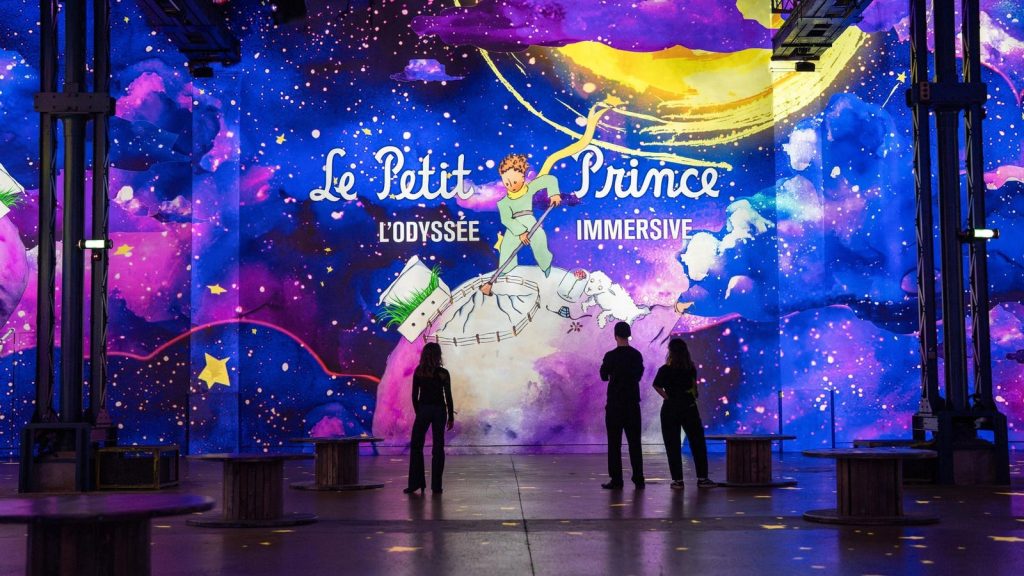The Little Prince, The Immersive Odyssey exhibition at Atelier des Lumières in Paris
Photo courtesy of Culturespaces / Cyrille De La Motte Rouge
Long before the word “sustainability” entered our daily vocabulary, Antoine de Saint Exupéry gave us a quiet, poetic manifesto on how to care for the world. In The Little Prince –the most translated French literary work in the world, with more than 600 official versions and over 300 million copies sold – the young, golden-haired prince lovingly tends to Asteroid B-612. He rakes the volcanoes to keep them burning safely, uproots the baobabs before they can split his planet apart and carefully shields his beloved rose from wind and cold.
Penned in 1942 on Long Island and published a year later, Saint Exupéry’s timeless novella feels more relevant than ever. As a writer, pioneering pilot and WWII hero, he was already wrestling with the pressing question of how we inhabit the earth. His fiction gently nudges us to reflect on time, space, responsibility – and the fragile beauty of what we call home. For Saint Exupéry, ecology wasn’t just about nature – it was about humanity. Decades ahead of his time, he saw the environment not only as the forests and skies he flew over, but as a shared space shaped by cities, economies, societies and souls. His Little Prince, an enduring symbol of French culture and humanist values, has become an ambassador across continents and generations – an unlikely yet ideal champion of our planet.
The Little Prince continues his journey on earth in search of mankind
Photo courtesy of Culturespaces / Cyrille De La Motte Rouge
Saint Exupéry’s warnings were clear: the catastrophes of the future could only be averted if we learned to live differently, to consume with care and to cherish what we’ve inherited. In his book Sauvons la Planète du Petit Prince (Save the Planet of the Little Prince), French writer and historian Jean-Pierre Guéno explores how Saint Exupéry’s work carried an environmental message that speaks directly to our times – a “total ecology” that calls for us to move beyond our selfish impulses to preserve the future of humanity.
That philosophy continues to flourish through the Antoine de Saint Exupéry Youth Foundation, managed by its delegate general, Nicolas Delsalle. Established in 2009 by the author’s heirs, the Foundation works to empower disadvantaged youth around the world, encouraging them to become active citizens of tomorrow. But its mission also carries a strong ecological dimension. The late François d’Agay – Saint Exupéry’s nephew and the Foundation’s former president – once explained in reference to Saint Exupéry’s 1935 plane crash in the Libyan desert with his mechanic-navigator André Prévot: “This Saharan ordeal is important. It reveals a reality: the importance of material contingencies necessary for our existence on the planet. We are very dependent on the earth. But our freedom is always present. The Foundation aims to help youth morally to acquire a certain general culture, which is an opening to the world, and materially by providing financial assistance to charitable organizations in the field of education.”
Bathed in luminous projections of Saint Exupéry’s iconic illustrations, The Little Prince, The Immersive Odyssey transforms the space into a celestial dreamscape where visitors journey through planets, poetry and imagination
Photo courtesy of Culturespaces / Cyrille De La Motte Rouge
The Foundation operates on that dual mission: offering material support for education, while nurturing moral and cultural awareness. “Young people must become aware of what is happening around them, of existence, of ecology, in the manner of Saint-Exupéry, which is perhaps a more humane way of understanding and becoming aware of our environment,” said d’Agay. With a prestigious patronage committee led by Claudie Haigneré – France’s former minister and Europe’s first female astronaut – the Foundation brings together voices from across science, aeronautics and culture. Legendary French sailors Thomas Coville and François Gabart lend their spirit of adventure, while solar flight pioneer Bertrand Piccard frequently takes part in initiatives that introduce youth to environmental action. It’s all in the spirit of the Little Prince himself.
This year, in celebration of the 125th anniversary of Saint Exupéry’s birth, the Atelier des Lumières digital art center in Paris created by Culturespaces is presenting a newly-opened immersive experience dedicated to The Little Prince, in collaboration with the Antoine de Saint Exupéry-d’Agay Estate. This immersive exhibition brings the author’s delicate watercolors and poetic words to life, inviting visitors of all ages on a dreamy voyage through the stars. Saint Exupéry’s illustrations and reflections are projected across walls and floors, surrounding viewers in a world where imagination knows no bounds. Talking roses bloom, foxes whisper their secrets, serpents slither with mystery and we glide effortlessly from desert dunes to grassy fields, from planet to planet – as if time and space no longer applied. Wrapped in this lyrical atmosphere, we walk alongside the Little Prince on his search to understand and connect with the world around him. As he wisely told the narrator, “It’s a question of discipline… When you’ve finished washing and dressing each morning, you must tend your planet.” And perhaps now more than ever, the world needs us to follow his example.

